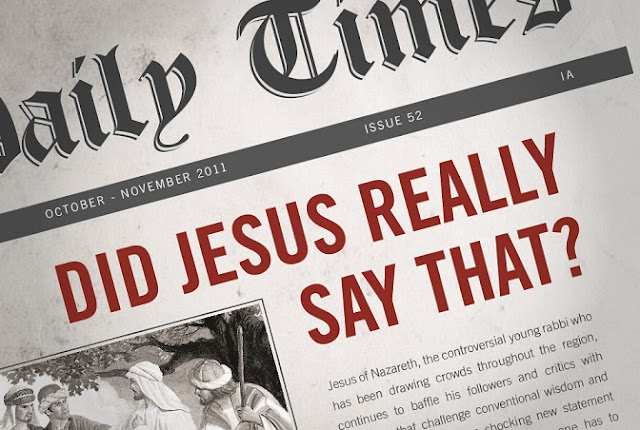“[After Peter
declares that Jesus is the Messiah, Jesus] then began to teach them
that the Son of Man must suffer many things and be rejected by the elders, the
chief priests and the teachers of the Law, and that he must be killed and after
three days rise again. He spoke plainly about this, and Peter took him aside
and began to rebuke him. But when Jesus turned and looked at his disciples, he
rebuked Peter, ‘Get behind me, Satan!’
he said. ‘You do not have in mind the concerns
of God, but merely human concerns’”
(Mark 8:31-33, NIV, bracket mine).
(Mark 8:31-33, NIV, bracket mine).
Jesus, the Son of God gave
up His life in order to save the world. To some, Jesus’ death on the cross
looks like an unnecessary surrender, a ‘loser’. But we now realize that without
His death and subsequent resurrection we would be “unredeemed” and the daily
personal guidance of His Spirit would not be available to us (see John 16:7). That’s
why it is necessary for Jesus to take up His cross…
Now, Jesus began to tell
His disciples of His coming death. But these men, particularly Peter, refused
to hear of it. They have misconceptions and misunderstanding of what the
Messiah first came to do. “You’re the Saviour,
you’re great,” they were thinking. “You’re
going to smash our enemies and we’re all going to ride to glory with you.” They
were rightly concerned, but they were wrongly concluded Jesus’ mission. That’s
where Jesus had to cut Peter short and introduce one of the most important
principles Christians must learn: the
way to up is down. In other words, the way to success in God’s plan is not
to rely upon our own intelligence or strength to push to the top. That’s the
pattern of the Satan-influenced human nature – “Get behind me, Satan!” “…merely human concerns” – smash and grab, look out for
yourself first, do unto others before they get a chance to do unto you.
But Jesus said, “Whoever wants to be my disciple must deny themselves and take up
their cross and follow me” (Mark 8:34). Roughly translated, that
means to set aside the primary goal of pleasing yourself first, to accept
willingly the unpleasant or uncomfortable situation that may result from denying
yourself, and then leave the outcome to God. That’s Jesus’ pattern for success
in the Kingdom of God. I love Jesus’ honestly; it hurts, but it is sweet and
necessary. Jesus doesn’t promise any easy way. True discipleship is costly, but
worth it. David Hewitt writes, “Jesus is
very honest about things; he does not hide the unwelcome demands in small
print. Neither does he ask anything of us that he is not prepared to give
himself. He has the right to ask us to take up our cross because he has carried
his own. The call to follow Jesus is not a call to give up certain things, but
to die. In this way, Jesus sifts out the true disciples from those who are
merely camp followers.”
On the surface, Peter’s
way of success looks like more fun and happier, but remember: after Jesus’ cross came His resurrection. After
His resurrection Jesus was more glorious and victorious than before. But it
would not have been so without the Crucifixion. If we follow Jesus through the
Crucifixion (deny self, take up the cross) we are also privileged to “follow” Him in the glory of Resurrection. In the
early Book of Acts, Peter eventually experienced Jesus’ style of success. After
received the power of the resurrected Christ, Peter committed to deny self,
take up his cross and follow Jesus wholeheartedly. According to tradition,
Peter was crucified upside-down for his faith.
“For whoever wants to save their life will lose it, but whoever
loses their life for me and for the gospel will save it. What good is it for
someone to gain the whole world, yet forfeit their soul? Or what can anyone
give in exchange for their soul?” (Mark 8:35-37). Jesus challenges
our values. Do we want to follow Him or not? If we cling on to life selfishly, worry
too much on our rights and privileges, we lose out in the end. That kind of
life is not worth having. It is foolish to sacrifice eternity for a moment. Jim
Elliot, a Christian martyr, says, “He is no fool who
gives what he cannot keep to gain what he cannot lose.” Think about
it.
“If anyone is ashamed
of me and my words… the Son of Man will be ashamed of them
when he comes in his Father’s
glory with the holy angels” (Mark
8:38).
Have you been ashamed to identify with a ‘loser’?
When Jesus returns, who will be the loser?
Take your stand for Jesus now – deny yourself, take up
the cross and follow me.
THINK BIG.
START SMALL. GO DEEP.













No comments:
Post a Comment